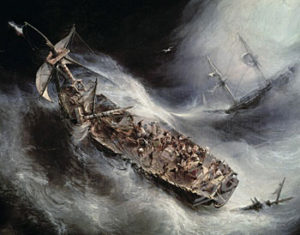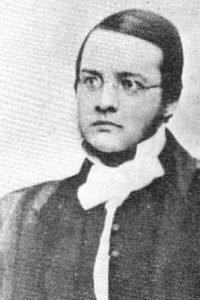Eternal Father, Strong to Save
Genesis 1:1–10; Psalm 3; Matthew 8:23–27; Matthew 14:22–33
(Lutheran Service Book 717)
 Eternal Father, strong to save,
Eternal Father, strong to save,
Whose arm hath bound the restless wave,
Who bidd’st the mighty ocean deep
Its own appointed limits keep;
O hear us when we cry to Thee
For those in peril on the sea.
O Christ, the Lord of hill and plain,
O’er which our traffic runs a-main
By mountain pass or valley low;
Wherever, Lord, Thy people go,
Protect them by Thy guarding hand
From ev’ry peril on the land
O Spirit, whom the Father sent
To spread abroad the firmament;
O Wind of heaven, by Thy might
Save all who dare the eagle’s flight,
And keep them by Thy watchful care
From ev’ry peril in the air.
O Trinity of love and pow’r,
Our people shield in danger’s hour;
From rock and tempest, fire and foe,
Protect them whersoe’er they go;
Thus evermore shall rise to Thee
Glad praise from air and land and sea.
The following stanzas from the original Navy Hymn may be substituted:
2
O Christ, whose voice the waters heard
And hushed their raging at Thy word,
Who walkedst on the foaming deep
And calm amid its rage didst sleep;
O hear us when we cry to Thee
For those in peril on the sea.
3
Most Holy Spirit, who didst brood
Upon the chaos dark and rude,
And bid its angry tumult cease,
And give, for wild confusion, peace;
O hear us when we cry to Thee
For those in peril on the sea.
“Eternal Father, Strong to Save” is a “new” hymn in our hymnals, but it is well know to members of the Navy. Wikipedia records, in part:

“Eternal Father, Strong to Save” is a hymn traditionally associated with seafarers, particularly in the maritime armed services. Written in 1860, its author William Whiting was inspired by the dangers of the sea described in Psalm 107. It was popularized by the Royal Navy and the United States Navy in the late 19th century, and variations of it were soon adopted by many branches of the armed services in the United Kingdom and the United States. … Accordingly, it is known by many names, … and sometimes by the last line of its first verse, “For Those in Peril on the Sea”. The hymn has a long tradition in civilian maritime contexts as well, being regularly invoked by ship’s chaplains and sung during services on ocean crossings.
The original hymn was written in 1860 by William Whiting, an Anglican churchman from Winchester, United Kingdom. Whiting grew up near the ocean on the coasts of England, and at the age of thirty-five had felt his life spared by God when a violent storm nearly claimed the ship he was travelling on, instilling a belief in God’s command over the rage and calm of the sea. As headmaster of the Winchester College Choristers’ School some years later, he was approached by a student about to travel to the United States, who confided in Whiting an overwhelming fear of the ocean voyage. Whiting shared his experiences of the ocean and wrote the hymn to “anchor his faith”. In writing it, Whiting is generally thought to have been inspired by Psalm 107, which describes the power and fury of the seas in great detail:
Some went out on the sea in ships;
they were merchants on the mighty waters.
They saw the works of the Lord,
his wonderful deeds in the deep.
For he spoke and stirred up a tempest
that lifted high the waves.
They mounted up to the heavens and went down to the depths;
in their peril their courage melted away.
Psalm 107: 23–26
Within a year the text appeared in the influential first edition of Hymns Ancient and Modern (HA&M) in 1861 and its circulation became widespread throughout England. The text was substantially revised by the compilers of that edition. In response Whiting continued to revise his own text, releasing another version in 1869 and third in 1874, the last one incorporating most of the suggested changes by HA&M.
Meanwhile, John B. Dykes, an Anglican clergyman, composed the tune “Melita” … to accompany the HA&M version of 1861. Dykes was a well-known composer of nearly three hundred hymn tunes, many of which are still in use today. “Melita” is an archaic term for Malta, an ancient seafaring nation which was then a colony of the British Empire … It was the site of a shipwreck, mentioned in Acts of the Apostles (chapters 27–28), involving the Apostle Paul.
Our hymn is one of the revisions. It makes reference to traveling via sea, land and air. Therefore Lutheran Service Book notes that it is appropriate at times of travel. However, the hymnal also includes verses 2 and 3 of the original hymn, which is exclusively about sea travel. This is the form that is popularly known as “The Navy Hymn.” Both forms are Trinitarian in nature.
Whiting’s first verse speaks of the Father in terms of creation. In Genesis 1 we read that “God” created the heavens and the earth. In a general way, Christians have always ascribed creation to the Father, redemption (saving us from our sins) to the Son, and sanctification (bringing us to faith, keeping us in the faith, and living the Christian life) to the Holy Spirit. This is one way we keep the Trinity clear in our minds. However the Scriptures ascribe creation to the entire godhead as well. So John tells us that nothing was made without the Son (John 1:3) and Genesis 1:3 clearly speaks of the Spirit’s role in creation. Because the Father is the source of all things, it is appropriate to think of him first in terms of creation.
Now when I say the Father is the source, we must be careful to not think of the Son and the Spirit as having beginnings. While the Son is begotten of the Father, he is begotten before all eternity. The same it true of the Holy Spirit, only we are told that he “proceeds” from all eternity. There has never been a time when God was not Triune. In deed, the Father could not be “father” if there is no “son.” So, as the Father is eternally “father,” so the Son must be without beginning or end.
Whiting begins with “Eternal Father, strong to save.” Whether we think of this simply as saving us from earthly dangers on the sea, or believe Whiting had a subtler meaning of eternal salvation, the line is true. For, just as Jesus was involved in the creation, so the Father was and is involved in our salvation. After all, John 3:16 tells us that “God [the Father] so loved the world that he gave his only begotten Son [Jesus]” to be our savior. The entire godhead is involved in our salvation.
In Psalm 3:1-3, David was faced by many dangers. The attacks were not just physical. They attacked his faith as well. They claimed that God would not save David. In other words, David’s faith in God was in vain.
O LORD, how many are my foes!
Many are rising against me;
Many are saying of my soul,
there is no salvation for him in God.
But you, O LORD, are a shield about me,
my glory, and the lifter of my head.
While his enemies claimed that “there is no salvation for him in God,” David knew that God was a shield about him, his glory and the lifter up of his head. In Whiting’s fourth stanza we find a prayer to our Triune God who shields us “in danger’s hour.” No matter what the danger, the Holy Spirit enables us to cling to the Gospel and hold to its protecting truths against those dangers (John 14:17). We also remember the words of our Lord Jesus, recorded in Matthew 28:20: “And behold, I am with you always, to the end of the age.”
There are many stories in the Gospels that feature Jesus and the sea, some in dangerous weather. One can be found in Matthew 8:23-27. After an exhausting day, Jesus and his disciples got into a boat to travel. Jesus fell asleep. A violent storm suddenly arose. Alarmed, the disciples woke Jesus. Jesus commanded the wind and sea to calm down, and they did! After this his disciples said among themselves, “What sort of man is this, that even winds and sea obey Him?” That is a profound question. One might say the question on which our eternal destination rests. The answer is, of course, that Jesus was and is both true man and true God – the very One who created nature, can control it, and who earned our salvation.
In Matthew 14 we find Jesus and his disciples in another dangerous sea setting. After feeding over 5000 people, Jesus sent His disciples back by boat to Capernaum while He went into seclusion to pray. Again, while the disciples were out on the water, far from land, a sudden storm arose. These sudden storms are quite common. In the dark of night, with the storm raging, Jesus, Lord of nature, came walking over the water towards the other side of the lake. When the disciples saw him, they were terrified. They thought they saw a ghost. Jesus assured them that he was no ghost. Peter spoke up (like he so often does) and asked Jesus to let him also walk on water and come to him. Jesus agreed and Peter boldly stepped out of the boat and began to walk on the water. But then Peter lost his nerve. He saw the waves and lost faith in Jesus to keep him afloat. Without faith, Peter began to sink. But Peter’s faith had not completely abandoned him. He knew to cry to Jesus for help and Jesus “reached out His had” and saved Peter.
We too face dangers all around. Those dangers might be natural, like storms, earthquakes, and so forth. They are often spiritual, as our trust in Christ and his will is challenged by our reason, our culture, other religions, and even Satan or one of his fallen angels. We may look at the waters of baptism and wonder “how can simple water save?” We might look at the Lord’s Supper and wonder “how can this bread and wine also be Christ true body and blood?” We might hear the words of absolution, spoken in the worship service, and wonder “how can the words of that man truly bring me forgiveness?” We may think of the death of Jesus on the cross and wonder, “how can the death of a man 2,000 years ago bring me forgiveness, life and salvation?” When such attacks come, we need to remember Peter, whose faith was also struggling, and follow his example. He cried to Jesus, “Lord, save me!” He will. Whether we are on land or sea, or even in the air, we are never beyond the gracious hand of our Lord. He will keep us safe until we reach our heavenly shore.
